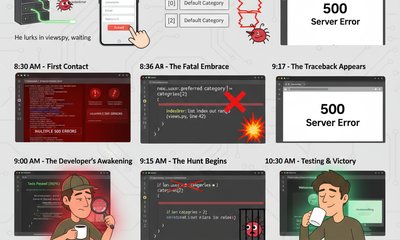A Day in the Life of a Django Bug
By JoeVu, at: Sept. 19, 2025, 6:45 p.m.
Estimated Reading Time: __READING_TIME__ minutes


The morning sun, a mere abstraction in the server rack, begins to warm the humming metal. Deep within a nested directory, a tiny, mischievous Django bug named IndexError stirs awake. His purpose? To wreak subtle havoc, to trip up the elegant flow of data, and generally make a developer’s day very interesting.
7:00 AM – The Initial Spark
IndexError isn’t self-aware, but the system feels his presence. He lurks in views.py, on a seemingly innocent line of code trying to grab something that isn’t there. Today, a new user is signing up for the AwesomeBlog platform. The signup form passes validation. Everything looks fine.
8:30 AM – First Contact: The User’s Form Submission
Alice clicks “Submit.” Her data travels across the internet and lands in the register_user view.
8:35 AM – The Trap is Sprung
The code assumes there are at least three default categories. But today, only two are present. IndexError hides at categories[2], waiting for the perfect moment.
8:36 AM – The Fatal Embrace
new_user.preferred_category = categories[2]
8:37 AM – The Traceback Appears
A red, angry message forms:
IndexError: list index out of range
The server logs scream. Alice’s browser shows a cold, unfriendly 500 Server Error.
9:00 AM – The Developer’s Awakening
Across town, Dave the developer sips his coffee. His monitoring dashboard flashes red: multiple 500 errors. His calm morning? Gone.
9:15 AM – The Hunt Begins
Dave dives into the logs. There it is, clear as day:
IndexError: list index out of range (views.py, line 42)
He’s found his quarry.
10:00 AM – Debugging the Culprit
Dave recreates Alice’s signup, stepping line by line. The categories list has only two elements. He lands right on the fateful line.
10:30 AM – The Fix
Dave patches the bug:
if len(categories) > 2:
new_user.preferred_category = categories[2]
Or better yet, he refactors the logic to guarantee the list is built correctly.
10:45 AM – Testing & Victory
Tests pass. Alice registers successfully. The monitoring dashboard returns to calm green. Dave sighs, drinks his now-cold coffee, and smiles. Another small battle won.
Lesson from IndexError’s Mischief
Always validate your assumptions about data structures. In Django (and Python in general), IndexError is one of the most common mistakes but also one of the easiest to avoid with careful checks, safe defaults, and proper testing.
At Glinteco, we’ve chased down countless “IndexErrors” for our clients so their users never see a 500 page. If you’re scaling a Django app and want fewer bugs (and hotter coffee ☕), we can help.


![[Python Decorators] Timeout](/media/filer_public_thumbnails/filer_public/4b/78/4b786acd-5184-46b5-81ab-93b6200d5786/python_decorators_timeout.png__400x240_crop_subsampling-2_upscale.png)


